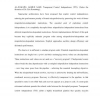1725 search results - page 263 / 345 » Relaxed genetic programming |
ASPDAC
2005
ACM
15 years 3 months ago
2005
ACM
The progressive trend of fabrication technologies towards the nanometer regime has created a number of new physical design challenges for computer architects. Design complexity, u...
ISCA
2006
IEEE
14 years 9 months ago
2006
IEEE
Conventional relaxed memory ordering techniques follow a proactive model: at a synchronization point, a processor makes its own updates to memory available to other processors by ...
CORR
2011
Springer
14 years 4 months ago
2011
Springer
In this paper, we study the average case complexity of the Unique Games problem. We propose a natural semi-random model, in which a unique game instance is generated in several st...
ISCA
2007
IEEE
15 years 4 months ago
2007
IEEE
AL-ZAWAWI, AHMED SAMI. Transparent Control Independence (TCI). (Under the direction of Dr. Eric Rotenberg). Superscalar architectures have been proposed that exploit control indep...
PPDP
2005
Springer
15 years 3 months ago
2005
Springer
The paper develops a self-tuning resource aware partial evaluation technique for Prolog programs, which derives its own control strategies tuned for the underlying computer archit...

